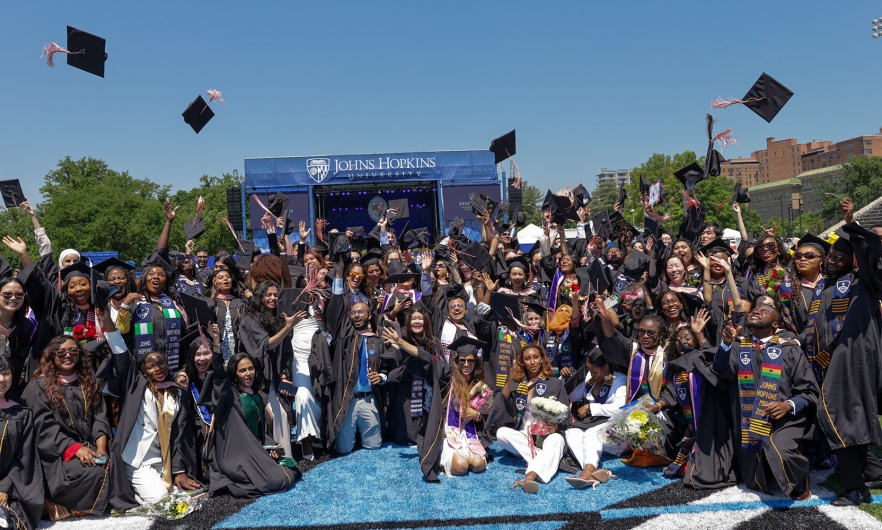Johns Hopkins Bloomberg School of Public Health Honors 1,273 New Graduates
Atul Gawande, assistant administrator for global health at USAID, joined Dean Ellen J. MacKenzie and student and faculty speakers at Bloomberg School’s 106th convocation ceremony

The Johns Hopkins Bloomberg School of Public Health recognized the Class of 2024 during its convocation ceremony on Wednesday, May 22, at the Homewood Field on Johns Hopkins University’s Homewood campus.
As of May 22, the Class of 2024 had 1,273 graduates from 66 countries, including the U.S. There were 129 doctoral degrees and 1,156 master’s degrees conferred—12 of them joint doctoral-master’s.
In her opening remarks, Ellen J. MacKenzie, PhD, ScM, dean of the Bloomberg School, advised the Class of 2024 to be fearless and dive deep into their work.
“Public health may start in a lab or a classroom, but the real impact happens out in the world. In the years to come, you should seek opportunities to see problems firsthand and partner with the people and communities affected by them,” she said. “This will not only fuel your research and practice, it will also take you on some of your greatest adventures.”
Dean MacKenzie also advised students to channel any anger they feel at injustices into finding solutions.
“You may have lost loved ones to diabetes or heart disease that could have been prevented. You may have seen your communities devastated by opioids or wrecked by environmental disasters. And we are all feeling the pain of human rights violations and humanitarian catastrophes across the globe,” she said. “There is far too much suffering in the world—but as you leave here today, I urge you to channel your strongest feelings into public health action.”
Keynote speaker Atul Gawande, MD, MPH, the assistant administrator for global health at the U.S. Agency for International Development, pointed to a community health system in Thailand, where neighborhoods have a village health volunteer who visits homes at least once a month. The volunteers and the establishment of neighborhood clinics and universal care have increased life expectancy in Thailand by 10 years.
The volunteers receive just 50 hours of training and a small stipend, Gawande recounted. But they are experts in caring, he continued, in recognizing suffering, and in coaxing residents to take the measures that will help them.
“Caring is at the heart of what you have to offer as public health professionals, and you offer it at the scale of communities, perhaps even nations,” Gawande told the graduating class. “You have learned how to diagnose a community’s needs and effectively connect them to an ever-growing storehouse of knowledge and capabilities. You have learned how to see their reality and to serve it. There are many, many roles and places in which to do this difficult and necessary work. Your mission is now to find yours.”
In his role at USAID, Gawande oversees a bureau with more than 900 staff advancing equitable delivery of public health approaches around the world. Previously, Gawande has been a practicing surgeon, nonprofit founder, and bestselling author.
Dean MacKenzie honored Gawande and Krishna Ella, PhD, founder and executive chair of Bharat Biotech International Limited, with the Dean’s Medal, the highest recognition the Bloomberg School confers on public health leaders.
Under Ella’s guidance, Bharat Biotech has become a global leader in developing affordable vaccines. The India-based company has supplied billions of vaccine doses in countries around the globe, saving millions of lives, including those of the world’s most vulnerable children. Ella has also worked on veterinary vaccines, food processing, and developing biotechnology infrastructure.
During the academic year, Dean MacKenzie also presented a Dean’s Medal to Peter Diggle, PhD, a distinguished professor emeritus at Lancaster University Medical School and an adjunct professor of Biostatistics at the Bloomberg School. During his 50-year career, Diggle has developed and reworked statistical models that transformed disease surveillance in regions confronted with challenging health threats.
As is a tradition at the Bloomberg School’s convocation, faculty and students recited the International Declaration of Health Rights, which was created by Bloomberg School students, faculty, and alumni in 1991 on the occasion of the School’s 75th anniversary. The Declaration is a commitment “to advocacy and action to promote the health rights of all human beings.”
The Bloomberg School Class of 2024 will join a network of more than 28,000 Bloomberg School alumni in more than 160 countries. The Bloomberg School has been ranked #1 by its peer schools and programs since U.S. News & World Report began ranking them in 1994.
# # #
Media contacts: Kris Henry khenry39@jhu.edu and Barbara Benham bbenham1@jhu.edu
